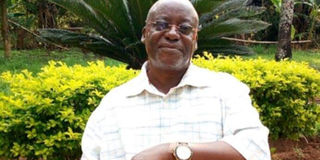Prime
Disappearance of police in Uganda Police: The dangers

Prof Charles Oweyagha Afunaduula
What you need to know:
- Prof Charles Oweyagha Afunaduula, a former Makerere University lecturer, argues that the continued deployment of army officers in police ranks is dangerous to the society.
In Uganda, the militarisation of politics and the police are parallel processes that have been pursued by President Museveni simultaneously and consciously.
As Andrew Mwenda once told the world, everything that is done or pursued by the President is done with a political motive. The political motive of militarising politics and the Uganda Police simultaneously and consciously can only be one; perennial power retention, not by him but by a small group of people that belongs to a perennial group that happens to have captured the instruments of power by force of arms in 1986. That group has a militarised collective mind and thinks and acts only in military terms and in political terms only by accident.
So, since politics is subordinate to militarism under the rule of President Museveni, the ultimate end is to penetrate politics and the police militarily and use politics only for the purpose of clothing militarism with a civilian deception.
With Idi Amin Dada, he did not want to lie, pretend or deceive Ugandans and the world. He banned politics altogether and ruled militarily altogether, although he retained the professionalism of the civil service, agriculture, Judiciary and the police. He never transferred soldiers from the army to those spheres of human endeavour. He even left Makerere University alone professionally, although he clogged it with spies and made some academic staff run away, leaving the institution depleted.
In this article I want to concentrate on the militarisation of the Uganda Police for power retention, not really ensuring security for Ugandans and their Properties. What is making me erect this statement for all seasons is because the more the Uganda Police has been militarised, the more crime has increased; the more people’s and community land has been grabbed by men in uniform; and the more Ugandans have been brutalised almost jointly by both the army and the militarised police, sometimes causing the President himself expressing concern about the brutalisation of Ugandans.
If cases of crime against humanity involving men in uniform have been pursued by police, none of the perpetuated of those crimes has been apprehended. Quite often they have been protected from the full arm of the law.
By militarisation of the police, I mean the total reorganisation of the police force so that the command chain from the Inspector General of Police to the lower levels of organisation of the Uganda Police Force, the personnel is now almost completely in the hands of the military.
At one time the Inspector General of Uganda Police (IGP) was a General in the UPDF. Right now the IGP is a professional policeman who is the last relic of the true Uganda Police as we knew it. The two officers immediately under him are not policemen but Generals of the UPDF. Virtually all commanders of police posts are military. Even intelligence officers in the police force are increasingly military.
What this means is that the country and Ugandans are almost completely militarily encircled. There is no more Uganda Police as we knew it to protect civilians and their properties as used to be the case. All guns are pointed at the civilians. No one can say he or she is free. It is now power in perpetuity or never. But not everyone can access the power. Only a small group of people.
When President Museveni captured the instruments of power by force, he negotiated with leaders of political parties to suspend their political activities. Over the years, he has been able to depoliticise the parties and render them almost dysfunctional, and only uses them in elections and in Parliament to show the world that he practices democracy. However, they are constantly and persistently under check jointly by army and the militarised police.
The first institution the President wanted to get rid of as soon as he captured power in 1986 was the Uganda Police. According to historical accounts, the police constrained his rebel activities in the Luweero Triangle. However, he did not get rid of it because his foreign backers - UK and USA - advised him against doing so.
However, by other means the President has been able to get rid of the Uganda Police and make police work a constituency of the army.
We have already experienced the consequences, and more are unfolding. As stated above, the work of Uganda Police and the Army is to protect the power of President Museveni at all costs, and by extension, a small group of people with a similar mindset that only members of their group must be in and own power, using Uganda’s financial and natural resources. Guns are used in every election organised by the regime to ensure leaders from alternative parties do not organise, campaign effectively or access power. Those that go to Parliament only make noise in there as the President gets everything he wants. Sometimes they have even been attacked militarily while in Parliament when they have tried to deviate.
The future of Uganda has never been so uncertain in the last 35 years of President Museveni’s rule as it is today. The reason is Mr Museveni himself, his choices and his action. We are now mired in contradiction in every sphere of human life, but the President has positioned himself in such a way that problems start with him as the cause and end with him as the only provider of solutions. The absolute majority of Ugandans now believe without Mr Museveni, there is no Uganda. Many believe the Uganda Police as a constituency of the army can no longer ensure peace and security for Ugandans. This is unfortunate.
The writer is a former lecturer at Makerere University and an environmentalist




